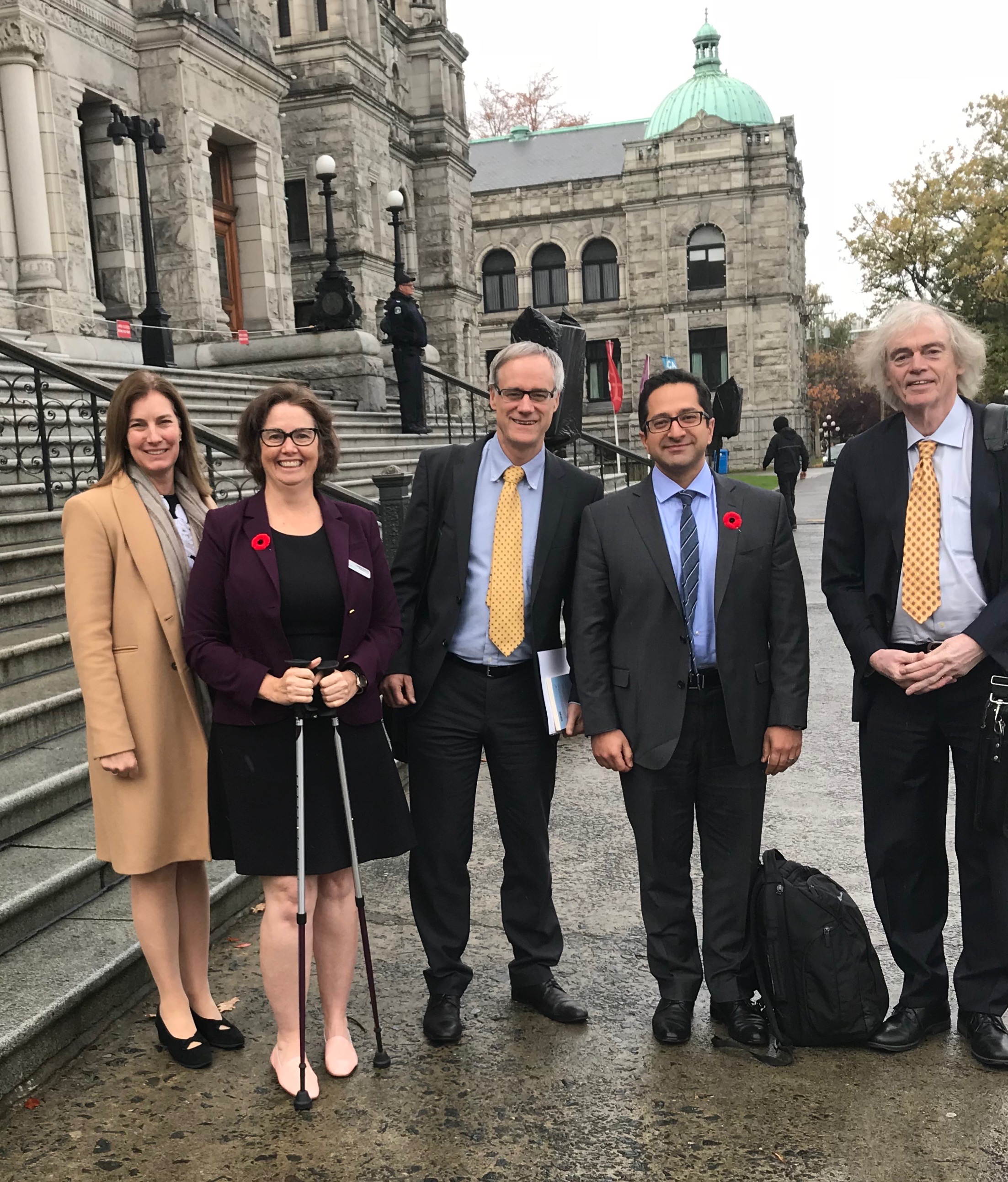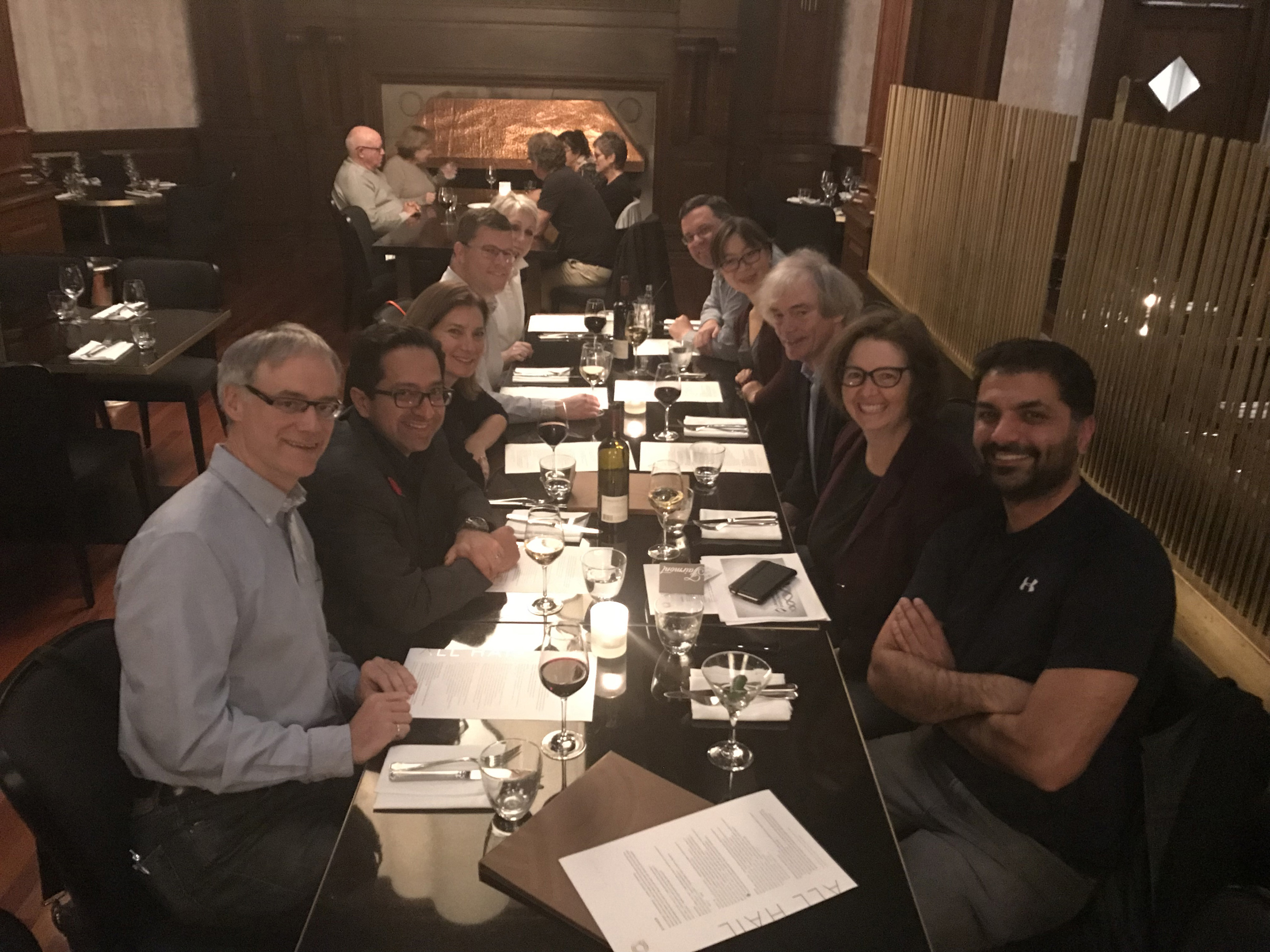More Than Engaging with Government – Let’s Work Together
On November 2, 2017, I had the pleasure and opportunity to represent LifeSciences BC board, together with Nancy Harrison, Chair, Board of Directors, Dr. Lesley Esford, President & CEO, along with other board members, Dr. Pieter Cullis and Scott Phillips. Our visit included breakfast with the NDP caucus and lunch with the Liberal caucus, where Dr. Esford presented an overview of the life sciences sector in B.C.
What we shared with government were several impressive and enlightening facts:
- There are 450 life science companies in B.C.
- Vancouver is rated as “Best City in the World” to start a new Business by CityUp Index and was rated by as the “#1 Best Startup Ecosystem” by Startup Genome to support entrepreneurs and raise seed rounds in Canada.
- B.C. is the only province in Canada, to develop and launch several novel products generating billions of dollars in cumulative revenue. Reflecting that B.C.’s life science companies have a track record of taking blockbuster products with historic regularity, from idea to market.A few of these products are:
- Visudyne® by QLT
- Taxus® by Agniotech
- Mozobil® by Anormed
- Vyxeos®, developed by Celator (recently acquired by Jazz Pharmaceuticals) and soon to be launched.
- B.C. is the only province and Vancouver one of the few cities in North America, except Boston and San Francisco, with three companies, Zymeworks, Innovative Targeting Solutions and Abcellera, signing global partnerships with 15 of the world’s largest global pharma companies, worth billions of dollars.
- In 2017, B.C. had the largest IPO in recent Canadian Biotech History when Zymeworks raised $80M. Several other companies including Aurinia, Arbutus and Aquinox raised hundreds of millions of dollars in public markets.
- B.C.’s life sciences sector, similar in size to the film industry by most metrics, contributes significantly more to the B.C. GDP than the film industry does. We also contribute to constant growth of solid middle-class jobs that include women, minorities and new immigrants.
Although we have experienced impressive progress and great accomplishments, we do face significant challenges and threats if we do not have a plan to manage our risks.
Top threats and challenges include:
- Other provinces and countries are aggressively pursuing our talented entrepreneurs, companies and capital to their jurisdictions. Our province does not have a clear and compelling strategy to keep and attract life science companies, including the potential removal of programs like the Patent Box Tax, which has provided competitive advantages to B.C. companies.
- Attracting world-class talent (and the capital that often follows talent) is difficult. This difficulty is due to two key reasons:
- A. Real estate prices and the cost of living compared to the wages offered in B.C. make it difficult to attract and retain top talent.
- B. The success and failure of startups have the same outcome for executives. Either 1) the start up is highly successful and is acquired by another company and in most cases the acquiring company retires the experts or 2) the startup fails, and scientists lose their jobs; with not many alternative options available given the small number of mature life science companies.
To mitigate the fallout, we can look to Quebec’s policy as an example to attract c-suite executives; they offer gradual tax breaks to foreign tech or life science executives to relocate to Quebec, as a viable incentive.
There are also are many opportunities for government to work closely with our industry to incorporate our innovative products into the health care system. These include; innovative medicines, devices or digital health solutions that can save costs and promote better health outcomes for our citizens.
B.C.’s rural areas, as well as our aboriginal communities are unable to access the same health care as larger cities. The life science industry has world-class solutions for these challenges. Made in B.C. digital health solutions are being pursued and implemented rapidly around the world by other countries, as is our research, but our own citizens cannot access or benefit from them. This must change if we are going to support a made in B.C. agenda
We must also champion that the innovative patient based solutions developed in British Columbia, have uptake in the province where the investment and development occurred. Reimbursement is a touchy and difficult subject and we hope to work with this government to illustrate that access to this important innovation, have a path forward and are part of the larger provincial vision.
We started a dialogue with government on November 2nd, and we will maintain an effort to stay engaged and lobby hard for the good of life sciences in B.C.


-
(from left) Nancy Harrison – Chair, LifeSciences BC Board of Directors; Dr. Lesley Esford – President of LifeSciences BC; Scott Phillips – Founder & CEO, Starfish Medical; Ali Ardakani – Founder & Managing Director, Novateur; Dr. Pieter Cullis – Professor, Department of Biochemistry and Molecular Biology, Faculty of Medicine, UBC. Before the visit of the BC Legislature, Victoria, BC – November 2, 2017


-
Presentation by Paul Kang, Chief Scientific Officer of Innovative Targeting Solutions – BC Legislature, Victoria, BC – November 2, 2017


-
Presentation by Livleen Veslemes, Chief Operating Officer & Chief Financial Officer of bioLytical Laboratories – BC Legislature, Victoria, BC – November 2, 2017


-
Presentation by Sue Paish, Chief Executive Officer of LifeLabs Medical Laboratories – BC Legislature, Victoria, BC – November 2, 2017


-
Members of LifeSciences BC after visiting BC Legislature, Victoria, BC – November 2, 2017


-
Ali Ardakani, Managing Director of Novateur and MLA Ralph Sultan – BC Legislature, Victoria, BC – November 2, 2017



